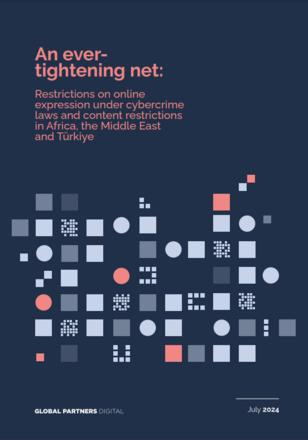
There has been an increasing misuse of cybercrime laws and online content regulations in Africa, the Middle East, and Turkey for the purpose of suppressing freedom of expression. According to this report, such laws are often enforced and justified in the name of national security or public safety, but they often violate international human rights standards.
Governments across the three regions enact vague laws criminalising online content. Broadly defined terms like “immoral content”, and “terrorist propaganda” are wielded as a cudgel against journalists and human rights activists. Jordan’s Cybercrime Law criminalises things like “stirring up strife” and “exposing public morals”. These laws are arbitrarily used to detain those who are critical of the government and attack a broad base of rights like freedom of expression, assembly, political participation, and many others.
At the same time, laws on disinformation have become tools used to suppress dissent. Several countries criminalise the distribution of “false information” without defining what it actually means. The lack of clarity enables the authorities to use such provisions selectively against critics. In Tunisia, the Cybercrime Decree provides heavy prison sentences for publishing fake news which creates an environment of self-censorship and fear. Likewise, Algeria and Egypt regularly apply disinformation laws to detain people who oppose government narratives. This undermines public confidence in the media and digital spaces.
The report also showcases how certain governments apply content restrictions to impose authoritarian value systems. Online expressions of LGBTQI+ identities, criticism of political figures, and human rights advocacy are criminalised through vaguely worded laws. In Uganda, Anti-Homosexuality Act criminalises anyone who shares any material that promotes LGBTQI+ rights. Those found guilty face severe imprisonment. Similarly, Saudi Arabia enforces strict penalties including death sentences for online criticism of religious or political leaders.
Governments are increasingly imposing heavy restrictions on digital platforms. In several countries, laws have been passed forcing platforms to actively monitor and remove banned content. These often require compliance with broad and badly defined content removal orders, putting platforms at risk of over-censorship. Under Turkey’s revised Internet Law, these same platforms are required to observe take-down requests and share users’ data. This helps the government create a centralised hold and regulate online content. This unduly hampers freedom of expression as well as turns online platforms into violators of their human rights policies.
Women, sexual and ethnic minorities bear the heaviest brunt of these restrictive legislations. In Iraq, for example, a reporting platform has resulted in an increase in the arrests of women and sexual minorities for content considered “indecent,” creating an environment of fear and self-censorship. Egypt has made arrests of female influencers for “violating family values.”
The report recommends that coalitions should be built among CSOs, international human rights mechanisms should be applied and public awareness needs to be raised. Digital companies are also required to maintain transparent rights respecting content moderation policies, even in environments with such restrictions. Other countermeasures against these laws include providing legal aid for those targeted and collaborating with NHRIs. Thus, the alignment of cybercrime laws to international human rights standards is crucial. Policymakers should avoid vague definitions and make sure that procedural safeguards are strong to protect online freedoms. Finally, the report underlines that it is of crucial importance to balance security needs with the protection of human rights.
Tags: media freedom Digital rightsThe content of this article can be used according to the terms of Creative Commons: Attribution-NonCommercial 4.0 International (CC BY-NC 4.0) . To do so use the the wording "this article was originally published on the Resource Centre on Media Freedom in Europe" including a direct active link to the original article page.

